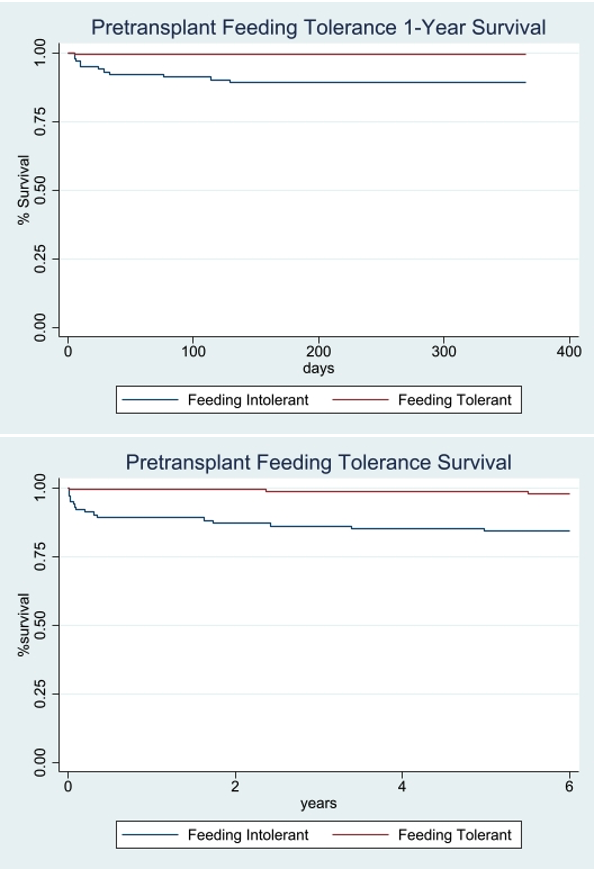Intestinal Insufficiency May Affect Outcomes After Pediatric Liver Transplantation
Surgery, Baylor College of Medicine, Houston, TX
Meeting: 2021 American Transplant Congress
Abstract number: LB 88
Keywords: Adverse effects, Liver, Mortality, Post-operative complications
Topic: Clinical Science » Liver » Liver: Pediatrics
Session Information
Session Name: Liver: Pediatrics
Session Type: Poster Abstract
Session Date & Time: None. Available on demand.
Location: Virtual
*Purpose: The purpose of this study is to determine if pre-transplant feeding intolerance is associated with poorer post-OLT (orthotopic liver transplant) outcomes in pediatric liver transplant recipients, in the setting of limited published literature on the relationship between intestinal integrity and liver transplant outcomes.
*Methods: A retrospective cohort study was performed on 248 pediatric patients who received orthotopic liver transplants between 2012 and 2019. 59 variables were collected which included lab values and perioperative complications such as thrombotic events, post-transplant infection, repeat laparotomy, ascites, gastrointestinal bleed (GI), and renal support. Patients were then categorized into feeding tolerant (n=154, n=171 pre- and post-op, respectively) or intolerant (n=94, n=77 pre-op and post-op, respectively) groups, based on several factors including their tolerance of feeds by mouth, tube feeds, or total parental nutrition. Chi-square tests were used to analyze the association between pre-transplant feeding intolerance and each of the outcome variables. Kaplan-Meier survival curves demonstrated 99% and 97% survival at 1 and 6 years in the feeding tolerant group, respectively, and 86% and 79% survival in the feeding intolerant group at 1 and 6 years, respectively.
*Results: Bivariate analysis showed that pre-transplant feeding intolerance was significantly associated with post-transplant feeding intolerance, hepatic artery thrombosis, portal vein thrombosis, renal support, prolonged intubation, post-transplant infection, ascites, GI bleed, mortality, at a significance level of .05 for each. Variables that were assessed for association but were not found to be significantly associated include repeat laparotomy and ileus.
*Conclusions: The results showed that pre-transplant feeding intolerance is associated with multiple post-transplant abdominal complications such as mortality and post-transplant infection. The implications of this highlights the importance of intestinal integrity reflected as feeding tolerance as a guide to perioperative risk stratification and care.
To cite this abstract in AMA style:
Batra AK, Desai M, Yang J, Cummins K, Oden-Brunson H, Ling H, Beer S, Goss J, Galvan N. Intestinal Insufficiency May Affect Outcomes After Pediatric Liver Transplantation [abstract]. Am J Transplant. 2021; 21 (suppl 3). https://atcmeetingabstracts.com/abstract/intestinal-insufficiency-may-affect-outcomes-after-pediatric-liver-transplantation/. Accessed March 4, 2026.« Back to 2021 American Transplant Congress

